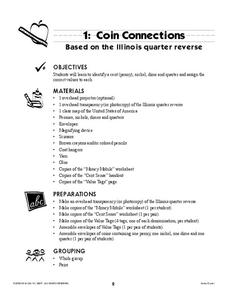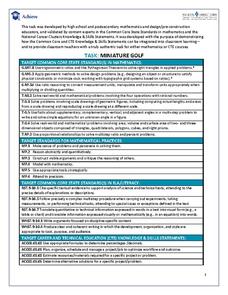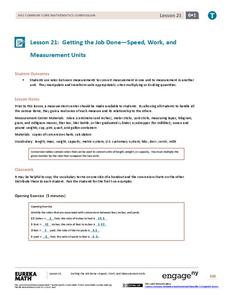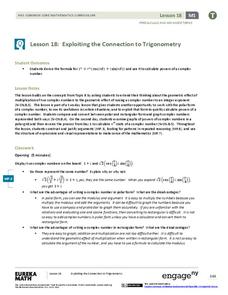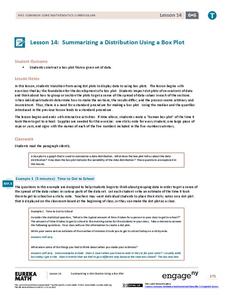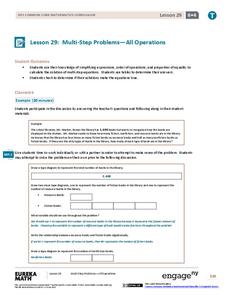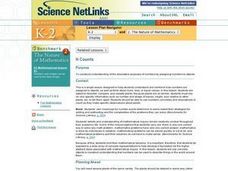Curated OER
Train Game
In this division and multiplication worksheet, 5th graders complete, by multiple choice, 4 division sentences by choosing the correct quotient from the cars in the train yard. Students choose, by multiple choice, the missing factor in 4...
Curated OER
How Big?
In this length and width worksheet, 2nd graders draw 6 specific items or objects that are the following measurements: 6 feet tall, 3 inches long, 9 inches long, 1 inch wide, 25 feet long and 4 feet long.
Curated OER
Writing Numbers With Song
Students study the numerals from one through five. In this number sense lesson, students sing a number song and practice drawing the numerals on the chalkboard. Students use their bodies to make the shapes of the numbers.
Curated OER
Mind Your Pints and Quarts: Making Sense of Liquid Measurement
Elementary and middle schoolers identify different units of liquid measurement. They use the online Visual Thesaurus to learn about the relationships between units of liquid measurement.
Curated OER
Equivalent forms of Fractions
Fourth graders use kidspiration software to demonstrate understanding of the concept of equivalent fractions. Using a combination of manipulatives, computer software and writing teachers can easily assess student mastery of number sense.
Curated OER
Coin Connections
A wonderful lesson on identifying the penny, nickel, dime, and quarter awaits your young mathematicians. They engage in a multi-session lesson which allows them to practice using the values of each coin in worksheets and activities...
Curated OER
Bye, Bye, Bye, Fraction Phobia!
Young mathematicians utilize video, the internet, and hands-on learning experiences in order to recognize that fractions aren't as "scary" as they first appear, and that we use them every day in our lives. The hands-on activities in this...
Curated OER
Understanding Proportions and Scale Drawings
Proportions are ratios found using multiplication or division. Middle schoolers solve measurement problems, find a figure's missing dimension, and find the distance between two points. Resource features four lesson plans with detailed...
Curated OER
Task: Miniature Golf
"Fore!" All right, no one really yells this out in miniature golf, but this well-defined activity will have your charges using lots of numbers in their unique design of a miniature golf hole. Included in the activity criteria is the...
Curated OER
Representing Data 1: Using Frequency Graphs
Here is a lesson that focuses on the use of frequency graphs to identify a range of measures and makes sense of data in a real-world context as well as constructing frequency graphs given information about the mean, median, and range of...
EngageNY
Getting the Job Done—Speed, Work, and Measurement Units
How do you convert from one measurement to another? Pupils use unit rates to convert measurements from one unit to another in the 21st segment in a 29-part series. They convert within the same system to solve length, capacity,...
EngageNY
Are All Parabolas Congruent?
Augment a unit on parabolas with an instructive math activity. Pupils graph parabolas by examining the relationship between the focus and directrix.
EngageNY
The Graph of the Equation y = f(x)
Math language? Set notation is used in mathematics to communicate a process and that the same process can be represented as computer code. The concept to the loop in computer code models the approach pupils take when creating a solution...
EngageNY
Exploiting the Connection to Trigonometry 1
Class members use the powers of multiplication in the 19th installment of the 32-part unit has individuals to utilize what they know about the multiplication of complex numbers to calculate the integral powers of a complex...
EngageNY
Estimating Digits in a Quotient
Boiling down any division problem to a one-digit divisor problem sure makes estimation easy. The lesson shows how to estimate division problems by using place value understanding and basic arithmetic facts to simplify the division. Some...
EngageNY
Summarizing a Distribution Using a Box Plot
Place the data in a box. Pupils experiment with placing dividers within a data set and discover a need for a systematic method to group the data. The 14th lesson in a series of 22 outlines the procedure for making a box plot based...
Core Knowledge Foundation
A “Whole” Lot of Fraction Fun!
Young mathematicians are introduced to fractions in a unit that helps them to understand parts of a whole.
EngageNY
Percent Error Problems
Individuals measure a computer monitor and determine how accurate their measures are. The eighth segment in a series of 20 introduces the concept of percent error. Pupils find the percent error of their measurements and discuss the...
EngageNY
Describing Variability Using the Interquartile Range (IQR)
The 13th activity in a unit of 22 introduces the concept of the interquartile range (IQR). Class members learn to determine the interquartile range, interpret within the context of the data, and finish by finding the IQR using an...
EngageNY
Multi-Step Problems—All Operations
Harness the power of algebra to solve problems. Young mathematicians learn to work out multi-step problems by applying algebraic techniques, such as solving equations and proportions. They use tape diagrams to model the problem to finish...
Curated OER
Making Simple Conversions
Young scholars explore the concept of measurement as it relates to equivalencies. They complete simple conversions using visual models of measurement units, and record their answers in a two-column table.
Kenan Fellows
Weight and Balance of an Airplane
A career in aeronautics might be calling your class members. Building from the previous two lessons in the series, learners continue analyzing the mathematics of aeronautics. Groups create a paper airplane using paperclips for balance....
Curated OER
Multiplication Snack Activity
Youngsters study multiplication facts by manipulating food in order to problem solve. They will use healthy snack items as manipulatives to solve various multiplication equations. Charts, tables, physical models, and so much more are...
Curated OER
It Counts
Learners classify and compare plants using specific information, observations, and numbers. In this mathematical inquiry lesson, students use plant characteristics to describe, compare, and classify them. They attempt to develop a system...





